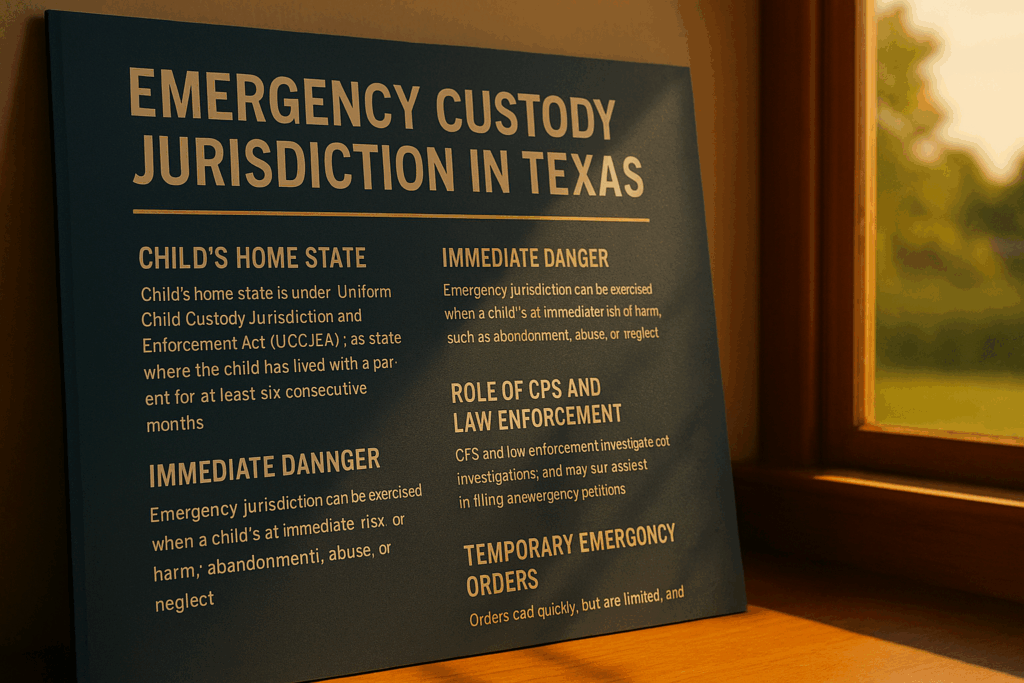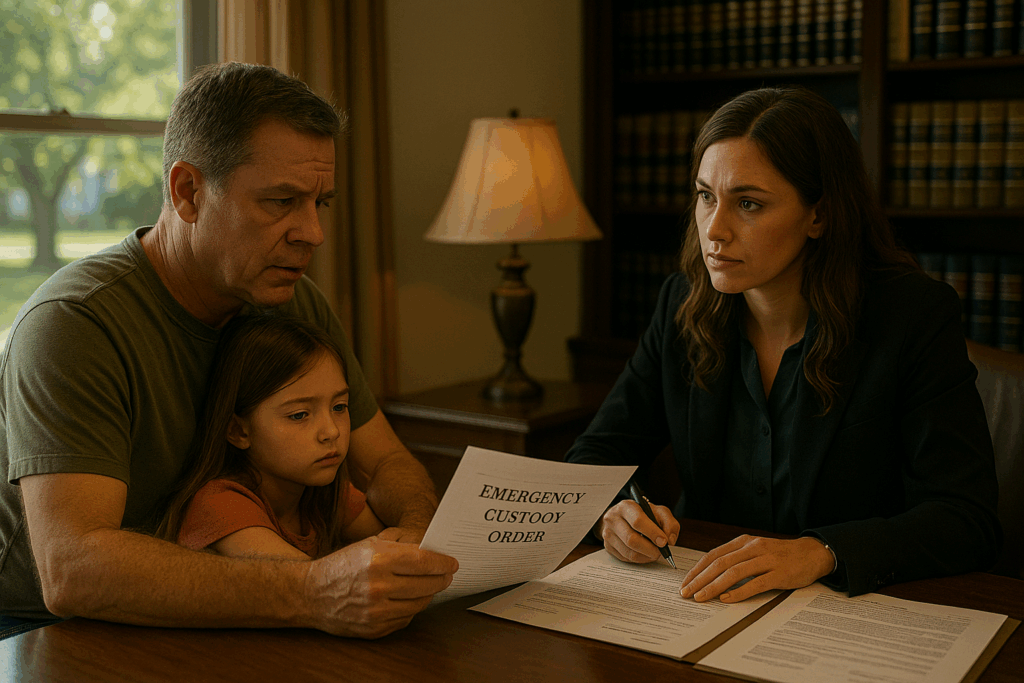
Imagine it’s a regular Wednesday night—homework sprawled across the kitchen table, dinner bubbling on the stove, and your kid is asking about their upcoming science project. Suddenly, you get a call that sends a jolt of panic: When Can Texas Exercise Emergency Custody Jurisdiction? It’s not just a legal phrase—it’s a lifeline when a child is in immediate danger. Here’s the short answer: Texas can step in swiftly when a child faces abandonment, abuse, or neglect, using emergency custody to protect their well-being even before the dust settles on a divorce or custody fight.
But let’s be real: navigating these laws while balancing school schedules, co-parenting tensions, and the fear of disrupting your child’s academic life can feel like trying to solve a Rubik’s cube blindfolded. That’s where this guide steps in. We’ll unpack the legal nuts and bolts—like what counts as “immediate danger” under Texas Family Code § 152.204—and show you how these decisions can ripple through your child’s school performance, friendships, and emotional stability. You’ll find tips you can use today to keep your child’s academic world from falling apart, insights that most parents never get, and real stories from families we’ve helped navigate these rocky waters.
At The Law Office of Bryan Fagan, PLLC, we’re not just about the law. We’re about educating families and protecting futures. Keep reading to find out how you can stay ahead of the curve, support your child’s education, and ensure that your family’s journey through divorce and custody is as smooth—and protective—as possible.
Key Takeaways
- Texas courts can exercise emergency custody jurisdiction when a child faces abandonment, mistreatment, or immediate risk of harm to ensure prompt protection.
- Filing for emergency custody requires specific documentation and evidence of danger, including police reports and medical records, to support legal claims.
- Engaging a family law attorney is crucial for navigating the complexities of emergency custody proceedings and increasing the chances of a favorable outcome.

Secure Your Child’s Future—Start Today
Don’t face custody challenges alone. Schedule your consultation now with a trusted Texas family law attorney and gain the clarity, support, and legal protection your family deserves.
Understanding Emergency Custody Jurisdiction in Texas
When Can Texas Exercise Emergency Custody Jurisdiction is a critical legal question when a child’s well-being is in immediate danger. Under Section 152.204 of the Texas Family Code, Texas courts can assume temporary emergency jurisdiction if the child is present in the state and has been abandoned or is in need of protection from mistreatment, abuse, or neglect. As we’ve seen in our work with Texas families, these emergency orders—such as restraining orders, protective injunctions, or temporary custody arrangements—are designed to provide fast, temporary relief while a more permanent custody solution is determined.
Our legal professionals have helped many clients understand the urgency and requirements for filing emergency custody motions. These situations often arise without warning, and courts act quickly when credible threats are present. Knowing when Texas can exercise emergency custody jurisdiction empowers parents to act decisively with the legal backing they need to protect their children. Gathering evidence—such as CPS reports, witness affidavits, or digital communications—can be crucial to proving danger or abandonment.
To learn more about preparing for the legal road ahead, we recommend reading our guide on what to expect in a Texas child custody case. At The Law Office of Bryan Fagan, PLLC, we’re committed to protecting Texas children and supporting parents through crisis moments with compassion, urgency, and legal precision.

Scenarios for Exercising Emergency Custody Jurisdiction
When Can Texas Exercise Emergency Custody Jurisdiction is a question many parents don’t think to ask—until it matters most. According to Section 152.204 of the Texas Family Code, Texas courts may assume temporary emergency jurisdiction when a child is present in the state and has been abandoned or faces an immediate risk of mistreatment, abuse, or neglect. These cases require swift legal action to prevent further harm. As we’ve seen in our work with Texas families, emergency custody jurisdiction exists to protect children who cannot wait for traditional custody proceedings to unfold.
Our legal professionals have helped many clients understand the urgency and complexity of these high-stakes situations. Emergency jurisdiction is not meant to permanently resolve custody—it is designed to safeguard the child while more formal legal processes continue, either in Texas or another state with ongoing jurisdiction. Temporary custody orders, protective injunctions, and restraining orders may be issued rapidly under this provision. For parents facing such circumstances, understanding when Texas can exercise emergency custody jurisdiction is essential to taking the right legal steps at the right time.
For more insight into how custody decisions are made and how emergency jurisdiction fits into broader family law proceedings, we invite you to explore our internal guide on what to expect in a Texas child custody case. At The Law Office of Bryan Fagan, PLLC, we are committed to helping parents act swiftly, protect their children, and navigate complex custody issues with confidence and compassion.

Child Abandonment Cases
Child abandonment is one of the critical scenarios where Texas can exercise emergency custody jurisdiction. If a child in Texas has been abandoned, the courts can intervene to provide immediate protection and care.
This situation often requires swift action to ensure the child’s safety and well-being, as abandonment can leave a child vulnerable to various dangers.
Mistreatment, Abuse, or Neglect
Mistreatment, abuse, or neglect are serious concerns that can prompt Texas to exercise emergency custody jurisdiction. Texas law defines these terms broadly to include:
- physical abuse
- neglect
- substance abuse
- domestic violence.
When a child is in Texas and has been subjected to or is threatened with such mistreatment, the courts can take immediate action to ensure their safety.
Immediate Risk of Harm
Texas courts can exercise emergency custody jurisdiction to protect a child facing an immediate risk of harm. Key aspects include:
- Issuing temporary orders to safeguard the child until a full custody hearing can take place.
- Requiring a showing of immediate danger to the child to prompt swift court intervention.
- Aiming to prevent further harm to the child’s well-being.
Legal Framework: The Uniform Child Custody Jurisdiction and Enforcement Act (UCCJEA)
The Uniform Child Custody Jurisdiction and Enforcement Act (UCCJEA) is pivotal in determining jurisdiction in child custody cases across the United States. The act aims to create uniform standards for child custody jurisdiction and enforcement, preventing parents from state-hopping for favorable custody rulings. Under the UCCJEA, Texas courts can issue custody and visitation orders, ensuring decisions are made in the child’s best interests, similar to a statute similar in purpose, including the enforcement act child custody.
For emergency custody, the UCCJEA allows Texas courts to maintain temporary jurisdiction until a proper custody case is initiated in the correct jurisdiction. Texas courts must recognize and enforce out-of-state custody orders, facilitating enforcement across multiple states. This framework ensures children receive needed protection, regardless of state lines.
Filing for Emergency Custody Orders in Texas
Filing for emergency custody orders in Texas is a high-stakes process that requires precision, urgency, and legal accuracy. Under Section 152.204 of the Texas Family Code, Texas courts can issue emergency custody orders when a child is present in the state and faces an immediate threat of abuse, neglect, or mistreatment—or has been abandoned. As our attorneys frequently advise, these petitions often require supporting affidavits that outline the specific nature of the danger. If the situation meets the statutory criteria, courts may grant relief the same day the petition is filed.
Our legal professionals have helped many clients understand the documents needed to file, how to present credible evidence, and what to expect during the initial hearing. Working with an attorney ensures compliance with both procedural requirements and the most recent updates to Texas custody laws. Whether you’re filing in your home county or need help identifying the correct venue, it’s critical to get it right the first time. To explore venue-specific guidance, we recommend reading this essential article on filing for custody in the correct Texas county.
If you’re uncertain where or how to begin, start by reviewing our resource on how to prepare for a Texas child custody case. At The Law Office of Bryan Fagan, PLLC, we are committed to guiding families through urgent custody matters with care, speed, and trusted legal knowledge. When every moment counts, knowing When Can Texas Exercise Emergency Custody Jurisdiction can help you take the right steps to protect your child.

Preparing Your Petition
When preparing your petition, include specific details about the child’s present address and living history over the past five years, as required under the UCCJEA. This information helps establish the child’s home state connections and the urgency of the situation.
The petition should comprehensively outline the reasons for requesting emergency custody and be supported by relevant evidence for a person seeking emergency custody.
Ex Parte Hearings
Ex parte hearings are crucial in emergency custody proceedings, allowing Texas courts to take urgent legal action when a child’s safety is in danger. During these hearings, the court can issue temporary emergency custody orders without the other parent’s presence, ensuring that immediate protective measures are in place.
The judge evaluates the evidence and decides to protect the Child’s well being.
Serving the Other Parent
Notifying the other parent about the emergency custody order is a legal requirement, ensuring due process in custody proceedings. In Texas, this can be done using a process server or law enforcement officer to ensure legal compliance.
The other parent must be formally notified of the emergency custody order, which helps maintain fairness and transparency in the legal process for the other party, with prior notice.
Evidence Required for Emergency Custody
When pursuing an emergency custody order in Texas, presenting compelling and well-organized evidence is essential. According to Section 152.204 of the Texas Family Code, courts can exercise emergency jurisdiction when a child has been abandoned or is subjected to or threatened with mistreatment, abuse, or neglect. As our attorneys frequently advise, the strength of your petition lies in the quality of the evidence submitted. This can include police reports, medical records, expert psychological evaluations, photographs of injuries, and documentation of unsafe or hazardous living environments. A sworn affidavit must accompany the petition, clearly outlining the child’s condition and referencing any prior custody determinations, especially if another state may have jurisdiction.
Our legal professionals have helped many clients understand how to structure this information effectively so the court has a clear picture of the immediate threat to the child’s safety. The petition must state specific facts about the child’s current living environment, detail why emergency relief is necessary, and disclose any previous custody orders or ongoing proceedings. In doing so, families help the court quickly determine the legitimacy and urgency of their request. Knowing When Can Texas Exercise Emergency Custody Jurisdiction is critical when a child’s safety is on the line—especially when exclusive continuing jurisdiction may still rest with another state under the Uniform Child Custody Jurisdiction and Enforcement Act (UCCJEA).
To learn more about building a strong foundation for your custody case, we encourage parents to read our internal guide on how Texas courts evaluate child custody factors. At The Law Office of Bryan Fagan, PLLC, we are dedicated to protecting your child’s well-being through meticulous legal strategy and heartfelt advocacy. Acting quickly—and correctly—can make all the difference in an emergency.

Role of Temporary Emergency Orders
Temporary emergency orders safeguard children facing immediate danger or abandonment until a full custody hearing can take place. The Texas Family Code provides the legal framework for issuing and modifying these orders, prioritizing the child’s safety and welfare. These orders allow immediate protective measures for a child’s safety and can have significant legal consequences if violated. They serve as provisional measures during legal disputes and can influence permanent custody decisions in the child’s home state.
Temporary emergency orders provide immediate protection for children while a thorough investigation and legal process take place. They prioritize the child’s safety while the courts work to establish a temporary order for a permanent child custody proceeding in the child’s best interests.
Importance of Consulting with a Family Law Attorney
Engaging a family law attorney ensures parents are well-informed about their rights and the legal processes in emergency custody cases. A family law attorney can:
- Help navigate the legal processes effectively.
- Guide parents through Texas family law complexities, improving chances of a favorable outcome in custody hearings.
- Provide support and strategies for addressing potential challenges from the other parent.
The Law Office of Bryan Fagan specializes in family law and has extensive experience handling emergency custody cases. Their attorneys provide the necessary legal expertise to help parents protect their children’s well-being and navigate the complexities of emergency custody proceedings.
Real-Life Examples and Case Studies
Real-life examples and case studies offer valuable insights into the challenges and successes of emergency custody cases. Clients of the Law Office of Bryan Fagan have shared experiences highlighting the emotional and legal journey of securing emergency custody orders. These testimonials offer a deeper understanding of the process and the firm’s commitment to protecting children’s safety.
In one case, the firm’s attorneys facilitated negotiations leading to a positive resolution for both the child and parents in a custody dispute. These real-life examples illustrate how the firm has successfully helped families navigate emergency custody situations, ensuring children receive the protection they need.
Practical Tips for Parents Facing Emergency Custody Situations
For parents navigating emergency custody situations, time is more than just a factor—it’s a lifeline. According to Section 152.204 of the Texas Family Code, Texas courts may exercise temporary emergency jurisdiction when a child is present in the state and has been abandoned or is at immediate risk of mistreatment, abuse, or neglect. As we’ve seen in our work with Texas families, taking swift, strategic action not only helps protect a child’s physical safety but also preserves their emotional stability during an already traumatic time.
Building a strong emergency custody case involves more than just filing a petition—it means assembling clear, credible evidence. This includes photographs of injuries, witness statements, medical records, and expert evaluations from professionals such as child psychologists. Parents should also inform their child’s school and healthcare providers of the situation to ensure consistency in care and help establish the severity of the danger. In urgent cases, involving local law enforcement or child protective services may also be appropriate. Our legal professionals have helped many clients understand that documenting every sign of abuse, neglect, or emotional distress is key to convincing a judge that emergency custody is warranted.
If you’re unsure how long the process might take or what steps follow an emergency order, we encourage you to explore this detailed guide on the Texas child custody case timeline. You can also find additional insight in our internal article on how Texas courts assess custody and emergency matters. Understanding When Can Texas Exercise Emergency Custody Jurisdiction can give parents the clarity and confidence to act quickly—and protect what matters most.

Impact on Children
Custody disputes can trigger various emotions in children, including fear, anxiety, and uncertainty. These situations can cause emotional distress, manifesting in behavioral changes like withdrawal or aggression. Long-term effects of custody disputes may include difficulties forming healthy relationships and potential mental health issues.
To minimize the negative impact of emergency custody on children, providing stability and consistency in their routine is crucial. Encouraging children to express their emotions can help them process feelings associated with physical custody changes.
Ex parte hearing are typically scheduled quickly to address urgent safety concerns for the child, ensuring protective measures are in place promptly.
How the Law Office of Bryan Fagan Can Help
The Law Office of Bryan Fagan offers:
- Free consultations to help potential clients understand their case specifics before proceeding.
- Assistance in understanding the types of custody orders available and their implications.
- Experienced attorneys who gather necessary evidence, file correct paperwork, and represent clients in emergency custody hearings.
By providing expert legal guidance and support, the Law Office of Bryan Fagan helps parents navigate the complex requirements of asserting emergency custody jurisdiction in Texas. Their commitment to protecting children’s safety and well-being makes them a valuable ally in these challenging situations.
Conclusion:
As you’re sipping your coffee and thinking about your child’s future, remember this: Texas takes emergency custody seriously when a child’s well-being is at risk, but so do you. Balancing your child’s academic stability and navigating custody challenges isn’t easy, but you don’t have to go it alone.
At The Law Office of Bryan Fagan, PLLC, we’re here to be your partner in the process—guiding you through the legal maze with compassion, strategy, and a genuine dedication to your family’s success. Because at the end of the day, your child’s future deserves a champion who knows the law and cares about the bigger picture.
So take a deep breath, gather the facts, and let us help you protect what matters most—your child’s safety and their bright future. Reach out to our team today to start the conversation and see how we can support you every step of the way.
What qualifies for emergency custody in Texas?
Emergency custody in Texas is generally granted when a child is in immediate danger of harm, such as abandonment, abuse, neglect, or exposure to domestic violence. The court assesses whether urgent intervention is necessary to protect the child’s safety.
Why would emergency custody be denied?
Emergency custody may be denied if the court finds insufficient evidence of immediate danger, or if the child’s home state has jurisdiction and is better suited to handle the case. Courts also weigh due process, including notice to the other parent, unless it’s an extreme emergency.
What happens if a parent does not exercise his visitation in Texas?
If a parent does not exercise their visitation rights in Texas, it generally doesn’t affect the other parent’s obligations under the court order. However, repeated failures to visit may be considered in future custody modifications, especially if it impacts the child’s well-being.
What is the jurisdiction of custody in Texas?
Texas follows the Uniform Child Custody Jurisdiction and Enforcement Act (UCCJEA), which prioritizes the child’s home state (where the child lived for six consecutive months) as the primary jurisdiction for custody cases. Emergency jurisdiction applies in cases of immediate danger.
What is the emergency jurisdiction in Texas?
Emergency jurisdiction in Texas allows courts to temporarily take custody when a child is present in the state and is in immediate danger. This ensures prompt action to protect the child, even if Texas isn’t the child’s home state.
Who can file for emergency custody?
A parent, guardian, Child Protective Services (CPS), or sometimes law enforcement can file for emergency custody in Texas if they believe a child is in immediate danger and needs protection.
Why would a judge deny a temporary custody order?
A judge may deny a temporary custody order if there isn’t enough evidence of immediate risk to the child, or if the petitioner fails to meet procedural requirements. Judges must balance protecting the child with respecting the rights of both parents.
Can you file for emergency custody if the other parent is in jail?
Yes, you can file for emergency custody if the other parent is in jail, particularly if the child’s safety or stability is at risk. Courts will consider factors such as the nature of the offense and the child’s best interests.
What is the difference between emergency custody and temporary custody?
Emergency custody is a rapid, temporary order issued when a child is in immediate danger and needs urgent protection. Temporary custody, on the other hand, typically lasts until a full hearing can determine permanent custody arrangements.
Bryan Joseph Fagan is a respected child custody attorney based in Houston, Texas, with deep roots in Atascocita. As the first lawyer in a close-knit family that includes two adopted brothers, Bryan brings a personal connection to every family law case he handles. His early caregiving experience—supporting his grandmother through Alzheimer’s while attending night school at South Texas College of Law—shaped his unwavering commitment to helping families through life’s toughest transitions.
Now a father of three, Bryan’s real-world parenting perspective enhances his legal insight. He leads one of the most dynamic family law teams in Texas, with a particular focus on child custody, visitation rights, and protecting parental rights. From hotly contested custody battles to amicable co-parenting arrangements, Bryan and his team understand that at the heart of every case is a child who deserves stability, safety, and love.
As a certified member of the College of the State Bar of Texas, Bryan holds himself to the highest standards of legal excellence and continuing education. He is known for crafting innovative, effective legal strategies that reflect both the letter of the law and the emotional realities families face.
Bryan’s practice spans every aspect of Texas family law, including:
Custody and visitation disputes
Modifications and enforcement of existing orders
Complex divorce proceedings involving children
Adoption and paternity cases
Marital property agreements
Defense against false CPS allegations
Bryan is also an active member of the Houston Bar Association’s Family Law Section and participates in statewide legal groups committed to improving outcomes for Texas families. Whether negotiating a peaceful custody agreement or litigating in court to protect a child’s best interests, Bryan Joseph Fagan is a fierce advocate for parents and children across Texas.


